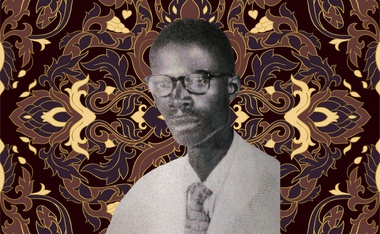The Bahá’í Faith, characterized by its promotion of the oneness of humanity, has experienced both triumphs and tragedies since its inception. One such tragedy is embodied in the story of Joaquim Sampaio, a remarkable figure in the history of the Bahá’í community in Angola. His legacy offers valuable insights into the principles of sacrifice, martyrdom, and resilience within the Bahá’í teachings. But what does the life and death of Joaquim Sampaio reveal about the importance of steadfastness in faith, particularly in the face of insurmountable odds?
The narrative of Joaquim Sampaio is not merely a tale of personal sacrifice; it reflects an ideological struggle entrenched in the socio-political context of Angola during a tumultuous period. Born in the early 20th century into a society fraught with colonial oppression and religious intolerance, Sampaio’s life represented a beacon of hope and conviction in a world increasingly beset by division. His early encounters with the Bahá’í teachings transformed him from a passive observer of societal injustices into an ardent advocate for equality and human rights.
Sampaio’s commitment to the Bahá’í doctrine was profound. The Bahá’í teachings emphasize the significance of unity, justice, and the divine purpose of humanity’s collective advancement. Amidst harsh realities, Sampaio embodied these principles through his unwavering dedication to community service. He worked ardently to disseminate the Bahá’í message, emphasizing the importance of love and understanding amidst prevailing hatred and enmity.
However, the peaceful propagation of faith often invites persecution. The socio-political climate in Angola during Sampaio’s life was characterized by a vehement resistance to change, particularly from colonial authorities who perceived the Bahá’í teachings as a threat to the established order. As Sampaio intensified his efforts to promote the principles of the Bahá’í Faith, the consequences of his activism became increasingly dire.
In an attempt to stifle the burgeoning Bahá’í presence, colonial authorities embarked on a campaign of repression against its followers. This was not merely a physical assault; it was an existential threat to a visionary perspective that advocated for equality beyond race, class, and creed. With profound courage, Sampaio chose to remain undeterred by the threats and reprisals directed at him and his community. He often articulated that “true worship consists in serving humanity,” which underscored his commitment to social justice and peace.
The defining moment in Sampaio’s life came as he was arrested for his beliefs. The circumstances of his imprisonment highlighted the perilous state of religious expression in Angola. Though he faced inhumane treatment, his spirit remained unbroken. His unwavering faith was a testament to the teachings he held dear: that martyrdom is not merely an end but rather a reflection of a divine purpose. Sampaio understood that his suffering was intertwined with the broader narrative of justice and human dignity.
Sampaio’s martyrdom resonated deeply within the Bahá’í community, marking a pivotal point in the Faith’s evolution in Angola. His sacrifice served to galvanize a sense of solidarity among followers, fostering a resilient community that refused to succumb to despair. This sense of collective identity illustrates a fundamental aspect of Bahá’í teachings: the power of collective consciousness and action in the face of systemic adversity.
In reflecting upon Joaquim Sampaio’s legacy, one must consider the implications of martyrdom within the Bahá’í context. What constitutes a martyr? Is it simply the act of dying for one’s beliefs, or does it transcend into embodying the teachings through one’s life choices? Sampaio’s life prompts us to explore the nuances of martyrdom, engendering a richer understanding of faith that encompasses both suffering and resilience.
Moreover, Sampaio’s legacy offers a framework for contemporary Bahá’ís grappling with the challenges of maintaining faith in a world rife with conflict. The lessons derived from his life are not merely historical; they serve as a guide for current and future generations. How does one cultivate steadfastness in faith while engaging with a world marked by division? Sampaio’s example inspires persistent prayer and action, a commitment to social justice, and an unwavering belief in the ultimate victory of truth over falsehood.
The repercussions of Joaquim Sampaio’s contributions extend far beyond the confines of his own life. They illuminate the path forward for those who strive to perpetuate the ideals of unity and peace. In commemorating the sacrifices made by figures like Sampaio, adherents of the Bahá’í Faith are called to rekindle their commitment to service and justice. A legacy is not only remembered but actively lived out through the principles of compassion, understanding, and mutual respect.
In conclusion, the story of Joaquim Sampaio stands as a poignant reminder of the sacrifices made in the name of love and justice. His unwavering commitment to the Bahá’í teachings, even in the face of formidable challenges, serves as an enduring source of inspiration. As followers navigate the complexities of modern existence, Sampaio’s legacy continues to illuminate the path towards unity, urging all to strive toward a world infused with the light of divine guidance. In doing so, we honor his memory and embrace our shared responsibility to cultivate a global society grounded in the principles of truth and justice.
